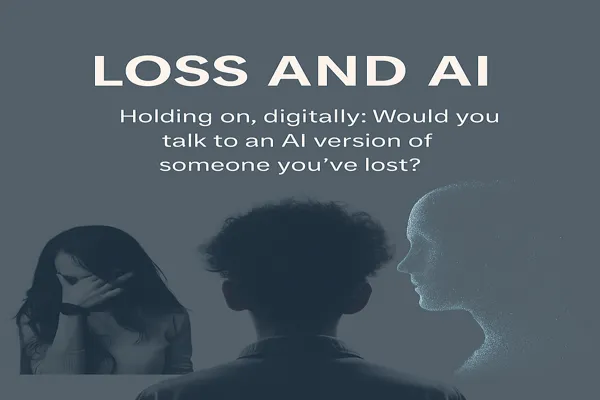
Loss and AI
𝗪𝗼𝘂𝗹𝗱 𝘆𝗼𝘂 𝘁𝗮𝗹𝗸 𝘁𝗼 𝗮𝗻 𝗔𝗜 𝘃𝗲𝗿𝘀𝗶𝗼𝗻 𝗼𝗳 𝗮 𝗹𝗼𝘃𝗲𝗱 𝗼𝗻𝗲 𝘄𝗵𝗼 𝗵𝗮𝘀 𝗱𝗶𝗲𝗱?
A short while ago, I sat at my 93-year-old mother’s bedside after she suffered a major stroke. By the time I arrived, she was unresponsive. I spoke to her, told her I loved her, said what needed to be said. And yet, I found myself craving one thing above all else: To hear her voice, just one more time.
It made me wonder… If there had been an AI avatar of her, her voice, image, and mannerisms. Would it have helped? Would it have brought comfort or closure? Or would it have pulled me away from those final, deeply human moments? What if a grieving child could say goodbye to an avatar that speaks back? What if we could continue conversations with those we’ve lost?
This is no longer science fiction. Startups like HereAfter AI, StoryFile, and GPT-powered memory bots already enable this recording stories, simulating voices, and creating interactive digital legacies. These tools are used in memorials, therapy, and grief support programs.
But with this power comes essential questions:
🔹 Can it support healthy grieving, or delay it?
🔹 Will it offer comfort or confusion?
🔹 Are these tools honouring connection, or simulating an illusion?
As someone working in psychology and exploring the human experience, especially loss, memory, and meaning, I believe it’s time to start talking about this. Not because AI can replace human connection. But because it's already becoming part of how some people try to hold onto it.
I leave you with this question to ponder - Would an AI version of someone you loved help you say goodbye, or make it harder?
